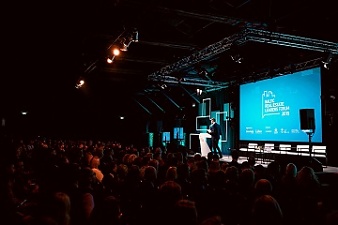Analytics, Forum, Latvia, Real Estate
International Internet Magazine. Baltic States news & analytics
Wednesday, 24.04.2024, 21:35
Offices of the future will have to offer more than the working premises
 Print version
Print version |
|---|
The
industry of leasing commercial premises is greatly influenced by entry of
the new generation into the labour market and their getting to leadership
positions. In childhood, these people were entertained more than their parents
and grandparents, therefore, in work they expect the opportunity not only to
work, but also to have a good time. To meet the labour force requirements,
company offices from outskirts will return to city centres, where there is more
active social life, and the very working space will not be as important as the
offer of additional services. Building owners also need to reckon with shorter
rental agreements, as tenants want flexible conditions and perceive the
premises as a service, rather than a permanent home, told Ķ. Sasnausks at the
conference. This means that the lessors of premises will have to work actively
on attraction of customers, to try to cater to their desires, receiving less
money in response, because time of easy profit is over.
In turn,
the international company Gensler sustainability evangelist
Kirsten Ritchie emphasizes that the buildings of the next generation should
play a significant role in stopping climate changes and promoting healthy
lifestyle. This will require not only building energy-efficient and environment-friendly
structures, but also deliberately planning the use of the premises, for the
cities to not grow up into huge monsters, where the road to work will take
several hours.
Currently
most advanced buildings constructed as the offices of the world's richest
companies are environment-friendly, can provide themselves with electric power
and heating, as well as encourage people to move using layout of premises and
placement of stairs. In the future more and more buildings, including
residential houses, will be built this way, said K. Ritchie. To obtain electric
power and heating, photovoltaic panels built in the walls and roofs will be
increasingly used, radiators will be replaced by heated floors heating the room
more effectively, and a variety of smart technologies will take care of minimum
consumption of water and other resources. Even now various buildings designed
by Gensler use more than 1,500 different sensors changing the
temperature and light brightness in the room, determining the number of people
and accordingly automatically adapting the heating or air-cooling systems.
Buildings with large glass windows will widely use self-tinting windows
responding to the power of sunlight and preventing it from blinding the office
workers, while ensuring optimal penetration of natural light into the room.
The
environment improvements will contribute to more productive work. For example,
studies show that natural air in the office increases efficiency of work by
11%, in turn, bringing the nature by 50% increase the ability
of workers to solve problems creatively.
Speaking
about the future of the working environment, the experts pointed
out that it will experience fundamental changes already in the next decade. The
workplace will become diverse and multifunctional, and own workplace will
gradually disappear. Workers will move around the room and work to solve the
corresponding task in the most suitable place – in co-creativity room for
implementing common projects, in a closed booth for conference calls or
intensive work, in multi-purpose room for events. Specialized meeting rooms
will be replaced by a more informal environment – cafes or lounges with a
pleasant, relaxing atmosphere. Work places in co-creation areas will no longer
be separated by walls to facilitate communication between the workers. It has
been noted that operational efficiency in such office type, where
these principles are already used, increased 2.5 times.
Since 70%
of the world's population will live in cities and towns by the middle of the
century, it is now critically important to use all office buildings as
efficiently as possible, so that as many people as possible can work in them.
Otherwise, the cities will expand rapidly, causing new challenges to logistics
and therefore global warming.
There have
been other inspirational lecturers that gave speeches at the BREL forum,
e.g. Spacescape CEO Alexander Stale told about the values
of the urban environment of the future in Northern Europe, Colliers
San Francisco Vice President Anna Natunewicz analysed the next
generation of consumers, and the Empathic Building founder
Tomi Teikko turned to one of the globally most pressing subjects at
the moment – how the digital world is changing the real estate business.
The forum
is organized by Colliers International и iDEA HOUSE
events.
The forum
partners – Eastnine, Origo One, developed by Linstow Center Mangement,
Kimmel Quarter, New Hanza Capital, Schneider Electric.








 «The Baltic Course» Is Sold and Stays in Business!
«The Baltic Course» Is Sold and Stays in Business!

